Template File: /www/wp-content/themes/stn2017/index.php | Template Hierarchy
WP version: 6.4.4
PHP version 8.2.18
The North of Scotland are hosting a Network Trauma Event on Wednesday 15th May at the Crowne Plaza, Aberdeen Airport.
The event is open to all health and social care professionals in the North of Scotland who are involved in the delivery and planning of trauma care.
An event programme will follow in due course.
Paediatric trauma pathways in the NoSTN have been rolled out and developed since August 2019 across Grampian and Highland.
Over this time, service improvement projects have been carried out to improve delivery of care to these patients. Of significance are the number of patients to benefit from the trauma pathway within RACH who do not meet STAG inclusion criteria. The trauma pathway, which includes psychology and trauma coordinator input alongside relevant specialties and therapies, has allowed for a greater cohort of patients to access enhanced care following a traumatic injury. Services have also been extended to include burns patients where appropriate. We continue to promote our service and pathway by regular face to face promotion and posters throughout RACH to ensure familiarity and an easy referral process for staff.
Data collected for RACH between August 2019 and June 2022 shows that 89 patients have been commenced on the trauma pathway. Of those, 22 patients did not meet STAG inclusion criteria. This equates to roughly 25% of all patients. Comparison of both patient groups shows similar mechanisms of injury and patient/family needs following injury, further justifying the need for inclusion of patients out with audit criteria. Data shows that accidents involving motor vehicles and falls from height were the most common cause of traumatic injury. Numbers are also currently being collected to identify how many patients required psychology input following traumatic injury, with or without a rehab need. The intention has always been to improve patient care for all patient groups by creating a robust pathway which can be replicated. These figures highlight the far reaching benefits of this pathway, showing that clinical reasoning for individual cases ensures the most appropriate patients are encompassed.
Patient experience questionnaires have been developed for paediatric patients and their families. There are 3 different questionnaires aimed at 7-11 year olds, 12+ years and parents/carers. These are designed to gain positive feedback regarding service delivery as well as to identify areas of improvement. Comments received from recently completed questionnaires are below:
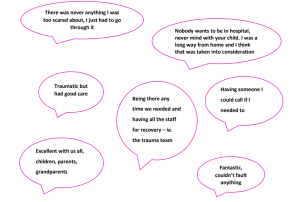
The paediatric trauma coordinator role recently adapted to include cross working over paediatric and adults MTCs. There have been many advantages to this. When an adult is admitted to hospital, their children’s lives are significantly disrupted. The child may not directly be involved in the trauma themselves. However, the dual role enables additional areas of support to be highlighted and provided for these families. Following education for adult colleagues, there is an increased awareness of child protection concerns. Links with paediatric services are now stronger and more efficient. There are times when a child/children and adult/s from the same family are admitted simultaneously. Having links with both hospitals enables smooth communication and visiting, joined up care and a consistent point of contact for the family. There is also a group of young people who may fall under adult services but whose needs very much lie within paediatric services. This can be dependent on age and stage, whether they are still a dependent living at home and whether they still attend school. Strong links with both teams ensures these patients have access to the appropriate professionals and that links can be made with schools/nurseries, families and third parties to ensure tailored support.
CBIT in Hand
We have recently established excellent links with our colleagues at the Child Brain Injury Trust. As a result, we have joined forces and launched the CBIT in hand app in RACH. This app is designed to provide information and advice following head injury to patients and families, professionals and third parties who come into contact with the child. Head injury may range from mild concussion through to traumatic brain injury. The app has been well received throughout the hospital by staff and patients alike. Details are being collected of those signposted to the app in order to gain feedback.
RACH Website
During the 2020 Covid pandemic, patients were contacted to gain information on preferred communication methods and access to information/resources. The responses overwhelmingly pointed to the need for online, electronic and easily accessible information. This was true from both patient and parent perspectives. It was identified that a platform for sharing such information was missing. Following research and networking around the hospital, it was found that this was a widely supported idea. Fast forward a few years and we are in the midst of RACH website development, having been lucky enough to secure the support and funding from the Archie Foundation. Once complete, this will feature a section for the Major Trauma Centre, helping to promote the identity of our service and provide easy access to online information for families.
Follow-up Phone Call Audit
Patients who are commenced on the RACH trauma pathway will receive a follow-up phone call from the trauma coordinator after discharge. The purpose of the call is to provide safety netting, advice and action any outstanding issues which the family may have. An audit was completed to identify potential improvements to the follow up process for paediatric patients. Findings were as follows:
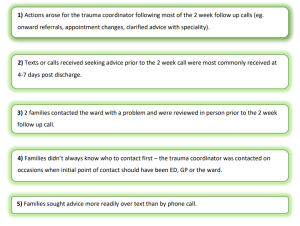
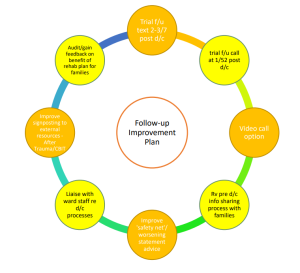
In October 2021 a team from RACH travelled to Orkney to undertake 2 days of paediatric trauma training. This involved lecture based education, multidisciplinary team simulation training with in situ practical procedures as well as question and answer sessions. Topics covered included chest and abdominal trauma, traumatic brain injury as well as child protection concerns and child death. The team thoroughly enjoyed their time there and the feedback was good. A similar trip is planned for September 2022 to Caithness General Hospital.
During Covid, the inpatient responsibility for those with head injuries moved from ED staff to the paediatric general surgeons. To try and ensure consistency with who was being admitted from ED, a proforma was created in accordance with SIGN guidelines. This has meant that decision making about who receives scans, who is observed, who is admitted etc is more streamlined and has led to clearer communication between the ED team and general surgery staff who look after these patients on the ward. The document has now been in circulation for over a year and we are looking at auditing its compliance in the near future. The remote and rural sites across the North of Scotland have also adopted this document. A similar inpatient proforma is also in circulation.
TRiM (Trauma Risk Management) is a trauma-focused peer support system developed to provide early help and information to staff who have experienced a traumatic/adverse/distressing event. Staff working in major trauma settings can be affected by a single distressing event or an accumulation of difficult/challenging situations. Indeed, this is relevant to working in a hospital setting more broadly and certainly not limited to major trauma. Enhanced staff support structures have been developed within RACH (and across NHSG) over the last few years. TRiM is one such development with an established pathway to request TRiM input following adverse events. Funding provided by the NoS Trauma Network enabled the Clinical Psychologist within the MTC pathway to complete TRiM training (practitioner and TRiM manager training) and contribute to the TRiM support available across RACH.
Written by Nina Currie (Paediatric Trauma Coordinator), Ashley Allan (Clinical Psychologist), Gillian Winter (Paediatric MTC Lead NoS/Specialty Doctor
The Scottish Trauma Network (STN) are pleased to announce the publication of the Nursing, Midwifery and Allied Health Professions (NMAHP) NMAHP Development Framework for Major Trauma.
This is hosted within the Education and Training section of the STN website;
https://www.scottishtraumanetwork.com/our-work/education-learning/
The NMAHP Development Framework for Major Trauma will be used by NMAHP practitioners caring for major trauma patients in any in-hospital setting at local, regional and national levels for identifying, planning and supporting learning needs, identifying career pathways and enhancing workforce planning.
This framework is the result of collaborative working between NHS Education for Scotland (NES) and the STN, working closely with NMAHP practitioners and consulting with the STN Education and Workforce group. It is aligned to the already published NES NMAHP Development Framework.
It is currently for registered practitioners at education levels 5-8 with the Healthcare Support Worker element following later in the year, in conjunction with the national HCSW commission.
Introduction by National Clinical Lead
Annual report time arrives once again, and in this new style of presentation my superlatives for the work of all who support the continued work, development and improvements of the Scottish Trauma Network will be brief. This is just as well, as the resources of my thesaurus begin to abate.
It is now 5 years since we convened and commenced our program of work to build and implement an entirely new clinical network of acute care and long-term rehabilitation for Scotland’s most seriously injured. August 30th 2021 witnessed the completion of Phase I with delivery of the fully operational end product. At time of writing, we run smoothly and successfully in the best traditions of “National Collaborative Pragmatism”.
All of this achieved of course, against the backdrop of complications presented to us by the pandemic. A remarkable achievement now recognised and acclaimed at the highest levels of the NHS, the Scottish Government, and national and international media.
This hard-earned and well-deserved reputation requires stiffening of the sinews and strengthening of resolve to be maintained, for us to progress further as we contribute well beyond our remit to the Remobilisation of the NHS in Scotland.
Thus, now begins Phase II, where we plan to tell the story using data, to raise standards for the future, and to demonstrate the sustained improved outcomes for patients, their families, their communities and the nation as a return on the visionary investment of these past 5 years.
The full report can be seen here
Martin McKechnie
National Clinical Lead
Scottish Trauma Network
In April 2022 the ScotSTAR Emergency Medical Retrieval Service (EMRS) North team marked 3 years of operations. EMRS North is part of the Scottish Ambulance Service (SAS) and is funded through the Scottish Trauma Network (STN). Operating from the Aberdeen Airport ScotSTAR North base the duty team comprises of a retrieval consultant and a retrieval practitioner / clinical fellow.
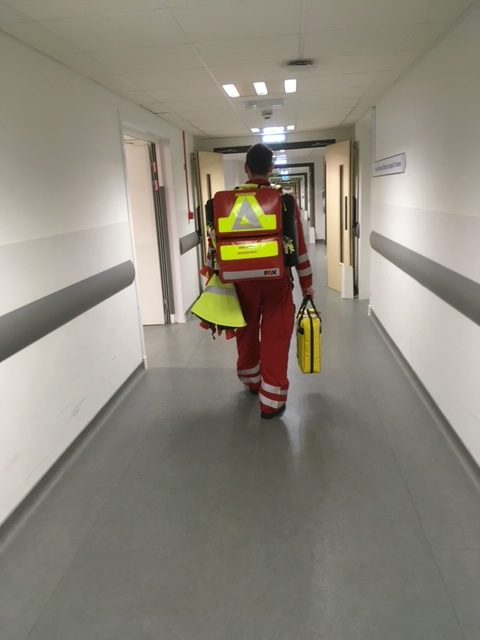
EMRS North consultants come from an anaesthetic, emergency medicine or intensive care medicine background. Consultants spend time working for EMRS and time working in their base hospitals. At present we have consultants from NHS Grampian, NHS Tayside and NHS Highland. The retrieval practitioners all come from a paramedic or nursing background and work full-time for EMRS. The clinical fellow posts have proved extremely popular and allow anaesthetic, emergency medicine or intensive care medicine specialty trainees to join the team for 6 months and develop skills in pre-hospital and retrieval medicine.
The EMRS North has 3 main roles-
EMRS North predominantly cover the North of Scotland but all procedures, equipment and tasking are the same as EMRS West which has two duty teams available 24/7. Practically this means at any one time there are 3 EMRS teams providing national cover spilt between the bases in Glasgow and Aberdeen. This cross cover has seen EMRS North attend taskings across Scotland from Shetland to the Scottish Borders and provides resilience.
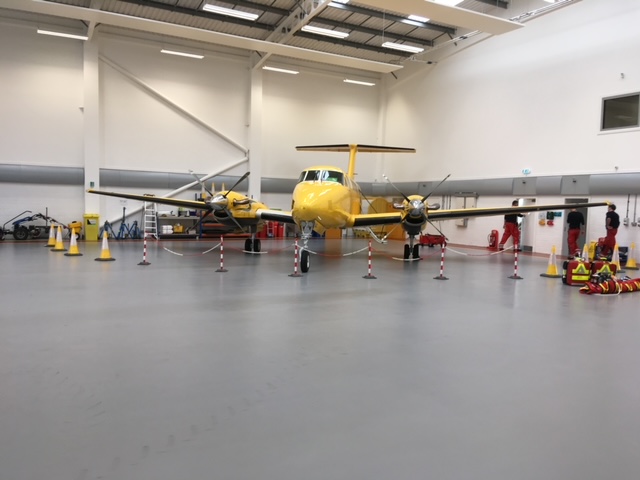
The workload is not exclusively trauma and is a good example of how the STN has wide reaching benefits especially in the care of critically ill patients.
In April 2020 Scotland’s Charity Air Ambulance launched their Aberdeen based aircraft Helimed 79. The Helimed 79 base is adjacent to the ScotSTAR North base and the teams work closely together. EMRS North and Helimed 79 brief and train together daily; when requested by the Trauma Desk EMRS North will accompany the Helimed 79 team allowing “red” interventions to be delivered faster and across a greater area.
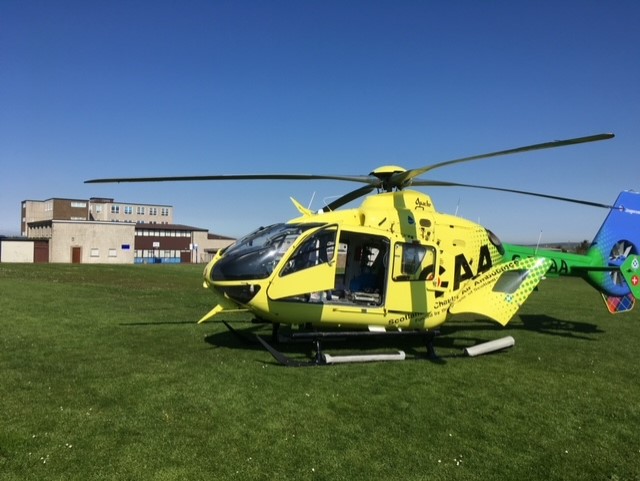
The first 3 years of EMRS North operations have seen-
Primary taskings typically take around 2.5 hours from a
ctivation to being back on base while secondary transfers take a bit longer with an average duration of 7.5 hours. EMRS North have responded to one major incident and assisted with cross-cover while other major incidents ongoing.
2021 saw the teamwork with Firecrest Films as part of the filming for the Channel 4 series “Rescue: Extreme Medics”. Episode 2 features the EMRS North duty team who attended a plane crash – check it out on All 4 (Channel 4 on demand).
Looking forward the team are expecting a busy summer with international tourists returning and rural populations increasing over the holiday periods. The team are also looking forward to getting out on more liaison visits to referring sites and local ambulance stations.
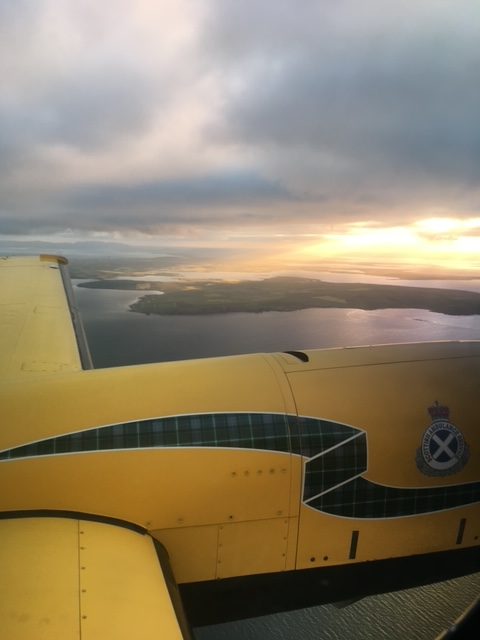
The Royal College of Physicians and Surgeons of Glasgow are delighted to let you know that tickets are now available to purchase for our upcoming International Orthopaedic and Trauma Conference which will be delivered in hybrid format on Wednesday 11th and Thursday 12th May 2022. The conference has been approved for 12 CPD points.
This conference is a key event in our educational calendar for 2022. Covering a wide range of subjects, it is relevant for everyone involved in orthopaedics and trauma, including consultants, orthopaedic training and non-training grade doctors, medical students, physiotherapy colleagues and orthopaedic and trauma nurses.
The Glasgow International Orthopaedic and Trauma Meeting will be a two day event with the opportunity to participate in a cadaveric or practical course prior to the conference
The cadaveric masterclass and trainee instructional course taking place on 10 May are an essential and integral part of the Glasgow International Trauma and Orthopaedic Meeting. Our cadaveric and practical courses allow for unparalleled hands on experience which will allow participants to develop their operative skills. Delegates will leave the course with increased confidence in their intra-operative decision making and will have the opportunity to pick up tips and tricks from a truly world class faculty.
Elbow Trauma and Approaches (rcpsg.ac.uk)
Further information and links to register for the conference can be found on the flyer or by following the link below:
Orthopaedic and Trauma Conference 2022 (rcpsg.ac.uk)
If you require any further information, please feel free to contact myself at donna.johnston@rcpsg.ac.uk
The NoS have released their Spring 2022. This issue updates on staffing changes, educational course and an update on the latest Key Performance Indicators (KPIs).
An introduction from Anne-Marie, NoS Network Manager:
Welcome to our new-look newsletter, we hope you like the new format. There is snow on the ground as I write this but my calendar assures me it’s spring! Unlike other springs though, I appreciate that services are still under extreme pressure and trauma workload has not diminished. The good news is that we are fortunate to have new trauma staff coming on board into new posts (details further on) while we say goodbye and thanks to colleagues who have worked on the development and implementation of the Network, such as Dr Luke Regan and Dr Angus Cooper.
Because of these pressures we have had to make the hard decision to postpone the Network Annual Event from 11th May to 31st August – please see further down for more information. Network colleagues were keen to have a face to face rather than a virtual event so I hope you can still attend and participate.
New developments and ways of working have continued to be implemented and we will cover many of these in the Network Annual Report which will be published later this spring. In the mean time we hope you have some time off to rest and recuperate during the Easter holidays.
Please click here to view the newsletter
Issue 12 – Winter Edition
The North of Scotland (NoS) have released Issue 12 of their newsletter. The NoS newsletter features an update from network partners and network staff, upcoming educational dates, NoS network statistics over the past three years and an article on Paediatric Trauma Training that took place in Orkney.
Please click HERE to view the newsletter.
The NoS has just celebrated it’s 3rd anniversary as a network, they’ve created a video to showcase what they have achieved in the last three years.
Please click HERE to view the YouTube video
Congratulations to the NoS Network!!
Issue 11 – Summer 2021
The North of Scotland have released Issue 11 of their newsletter. The newsletter features updates from the STN, MTC and the trauma documentary. There is a focus on Psychology services within the network and information on upcoming education sessions.
To download the newsletter, please click HERE
The eighth report by the Scottish Trauma Audit Group (STAG) since 2011 can be found on the Public Health Scotland website. Compliance with a subset of the Scottish Trauma Network Key Performance Indicators, case-mix adjusted mortality and Patient Reported Outcome Measures (PROMs) are within part one of the report. Part two and three provide a comprehensive summary of injuries and the patient journey for both adults and paediatrics respectively.